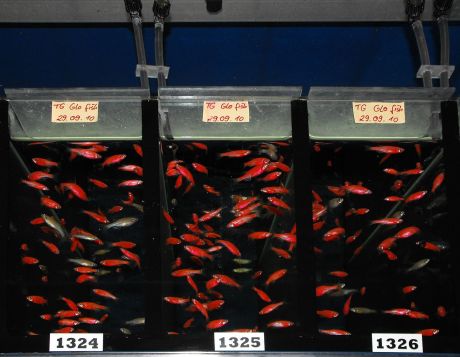
Danio rerio GloFish science institute aquaria
By real name: Karol Głąb pl.wiki: Karol007 commons: Karol007 e-mail: kamikaze007 (at) tlen.pl (Own work) [GFDL (http://www.gnu.org/copyleft/fdl.html) or CC BY-SA 3.0 (http://creativecommons.org/licenses/by-sa/3.0)], via Wikimedia Commons
During development, the vascular system forms very early on to facilitate delivery of nutrients, oxygen, and cellular and humoral factors in the embryo, in addition to helping clear waste. Serious disruptions in the formation of the vascular network are lethal or have important consequences throughout embryonic and adult life. Therefore, it is important to understand the mechanisms implicated in the formation of the vascular system, especially since some are reactivated during disease states of angiogenesis.
In this context, the EU-funded VASCDEVZEB (Genetic analysis of vascular development in zebrafish) project set out to identify novel regulators that are involved in the process of vessel formation. For this purpose, the VASCDEVZEB researchers took advantage of the imaging and genetic capabilities of the zebrafish as a study model. The project focused on two different aspects of vascular formation. To understand the link between lipid metabolism and angiogenesis under pathological conditions, the researchers characterized novel zebrafish mutants bearing high-, or low levels of lipids in their blood circulation. Comparative analysis of the gene expression profile of endothelial cells from normal, lipid-depleted, and lipid-overloaded zebrafish led to the identification of molecules that are controlled by lipoprotein levels.
In addition, the researchers used time-lapse imaging of living zebrafish embryos to follow the formation of the first lymphatic vessels. They identified a novel population of endothelial cells giving rise to lymphatic vessels and identified the molecular signals that promote the transition towards acquiring a lymphatic cell fate.
Considering the prevalence of circulatory system health issues, the results of the VASCDEVZEB study have great medical relevance. The identified molecules could serve as the basis for novel interventions for treating metabolic related cardiovascular disease and tumour-related angiogenesis and lymphangiogenesis.

